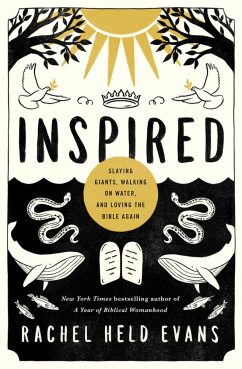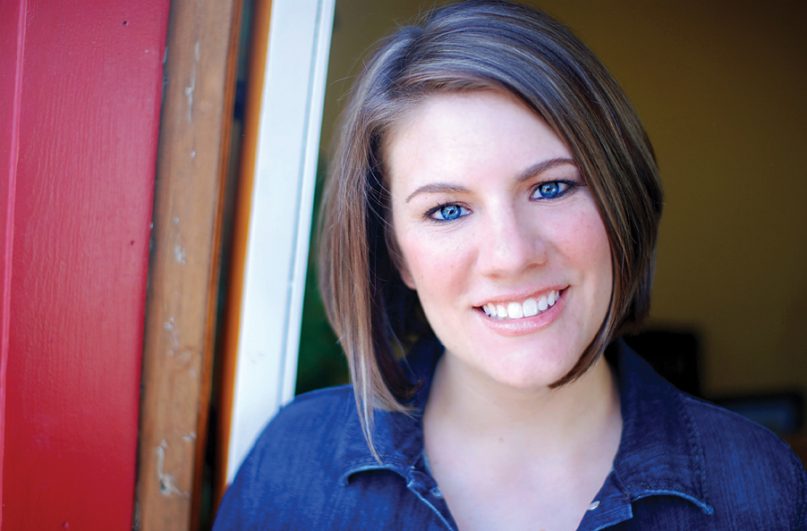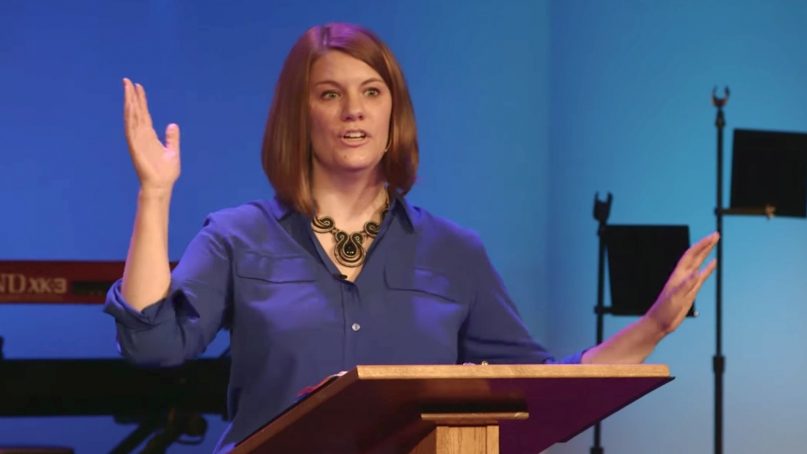(RNS) — Rachel Held Evans was raised reading the Bible in a conservative evangelical environment, winning awards for “Best Christian Attitude” and “sword drills” that tested her ability to find passages in the Bible.
Tens of thousands of readers have journeyed with Evans since on social media, her blog and her best-selling books as her faith has evolved. Many are post-evangelical themselves, as she is, and those are the readers she always has in mind, said Evans, who now attends an Episcopal church. But with her new book, “Inspired: Slaying Giants, Walking on Water, and Loving the Bible Again,” she also had in mind readers from progressive Protestant traditions interested in the intensive Bible study found in evangelical churches.
“I hope my having grown up a complete Bible nerd will help them out,” she said.
In “Inspired,” Evans explores what the Bible is and how it’s read. She describes its origin stories and resistance stories, investigates their contexts and interpretations and even retells a few along the way in poetry, soliloquy and choose-your-own-adventure genres.
She talked to Religion News Service about those stories this week. This interview has been edited for length and clarity.
Why write about understanding the Bible and how it’s meant to be read, and why now?
I’ve done a lot of deconstructing over the past few years, kind of like taking everything apart and re-examining it when it comes to my faith. Just in the last few years, I’ve wanted to build things back. I want to reclaim church and the Bible and prayer and all those things that are part of faith. I want to find what is good in that and left in that for my faith.
The Bible was so important to me growing up and it was such an important part of my faith, it was just something I had to wrestle with and had to make sense of and had to confront in order to make my faith make any sense as it stands.
“Inspired” is unlike your other books in that it weaves together different genres. You include the genres of memoir, poetry, screenplay and choose-your-own-adventure story. Why approach the topic through these different genres?

Image courtesy of Thomas Nelson
I wanted to challenge myself and not get in a creative rut. I wanted to make it an enjoyable read because I pack a lot of scholarship into this book, and I thought, “I’ve got to make this fun and interesting and creative.”
If you understand the genres of a text, we can make so much better sense of them. I think this is one of the biggest mistakes Bible readers make, or people of faith make when they come to Scripture, just mischaracterizing the genre of a text. Putting in my own poetry and short stories and fiction and screenplays — that’s reinforced the concept of understanding that the genre of a text is important to understanding what the author of a text is trying to communicate.
How were you taught to understand the Bible growing up as an evangelical Christian, and how has your understanding changed?
I had this impression the Bible needed me to defend it constantly, to defend the veracity of a giant fish swallowing a man whole and a talking snake and a magic tree. I was raised to interpret everything as literally, scientifically and historically accurate. It wasn’t until after college that I began to deconstruct that idea, mostly because it seemed so obvious to me as a person who is a lover of literature that these texts were not actually meant to be science and history texts — that they read like stories or poetry or letters or ancient creation narratives.
Some certainly are rooted in history, but figuring that out is the work of hermeneutics. It’s the work of the interpreter. A lot of people have wrestled with that through the years.
How should Christians approach the Bible, and what role should it play in their lives?
The key for Christians is that we interpret Scripture through the lens of Jesus Christ. That said, we also have to let these stories stand on their own. We have to consider who they were originally intended for and the message that those people were trying to communicate. Taking it on its own terms also means respecting that God chose to speak to ancient people in ancient ways that we don’t always understand.
The Bible is meant to be a conversation starter, not a conversation ender. So many of us were raised to want it to speak with a single voice, and it doesn’t. We can either freak out about that and try to make things harmonize or make things OK that we’re not OK with, like genocide and violence and misogyny. Or we can accept the Bible on its own terms, and that includes the parts that make us uncomfortable and we disagree about, and use those tensions as a point of conversation and getting to know God and one another better.
Despite the trolls, you have some kind words for social media and the role it played in introducing you to people who come to the Bible with different experiences from yourself. Why is this important?

Author Rachel Held Evans. Photo courtesy of Harper Collins
I cannot be one of those people who just disses social media when I basically built a career from it. It was blogging that got people interested in my books and social media that keeps my readers engaged.
I live in a very small town in East Tennessee. My exposure to people with viewpoints different from my own is limited here, so the ability to access that just like that — Wil Gafney is a womanist biblical scholar who I follow on Twitter. I can ask her a question about Hagar and get an answer. It’s amazing.
Social media is a tool. You can use it for good or for ill, but for the research for this book and my understanding of the Bible, it’s been invaluable.
That’s a theme that seems consistent in your books — that Christianity isn’t about having the answers but about discussing the questions in community. How does this inform how Christians read Scripture?
There’s this notion that the white and Western interpretation of Scripture is the default. That when black women interpret the Bible, they’re doing it contextually. We’re all actually interpreting the Bible in a context. We’re all bringing our backgrounds, our gender, our socioeconomic status or race. We bring all of that to the Bible, so we’re limited in how much we can really learn from it because of that, unless we deliberately and willingly and joyfully hear what other people have to say. Somebody coming from a minority community is going to read the Bible differently than I am.
The more we surround ourselves with people who are unlike us, the richer the text becomes. You see these shades and contours you wouldn’t have picked up on. It’s such a gift. It is a little unnerving when somebody tells you their take on a Bible passage that’s familiar to you is completely different from yours. But almost every single time, I’ve found it to be enriching and to help me understand it better and bring me into closer community with other people. The best literature always does and sacred literature should especially.





